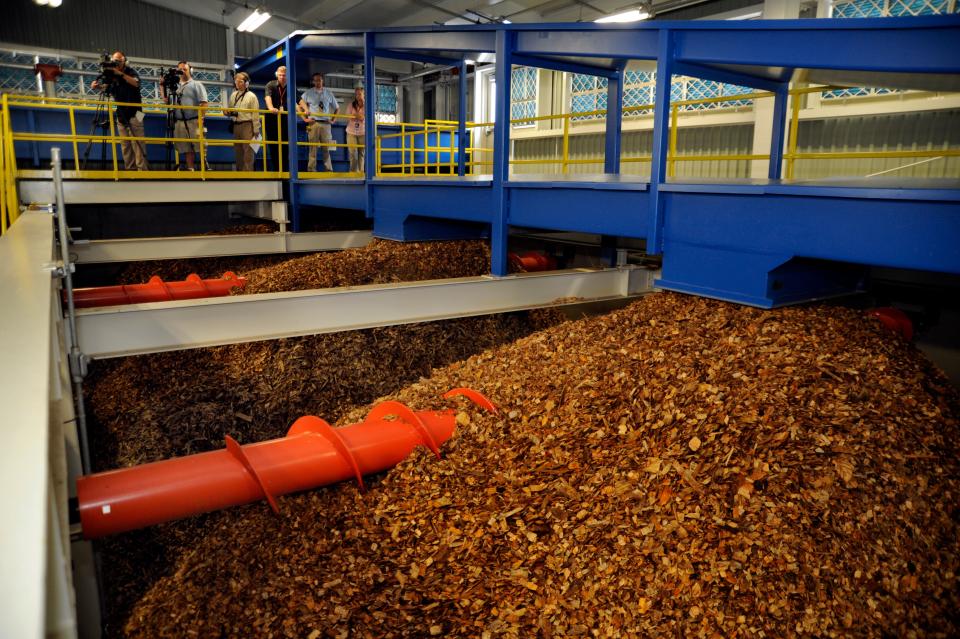'What is biomass?': With changes coming to Madison Land Use Ordinance, residents wonder
MARSHALL - At least one energy company has reached out to the county and Development Services Director Brad Guth to explore the potential of Madison permitting a biomass facility, according to Planning and Zoning Director Terrey Dolan.
Currently, the county's Land Use Ordinance provides no language on biomass facilities.
In its Aug. 2 meeting - continued from July 19 after the board failed to meet a quorum - the Planning Board will consider making changes to the Land Use Ordinance for a new section to create and implement a newly formed "Section 8.3 (Biomass Facilities)" as a regulated land use category.

This new Land Use Ordinance Section 8.3 would provide specified permit conditional language to be utilized for the consideration by the Board of Adjustment for any biomass facilities proposal.
Planning director: Madison board 'needs rapid changes' after failing to meet quorum July 19
In other news: Mars Hill Elementary School new principal Jimmy McGregor: 'It's good to be back home'
Still, the term "biomass" eludes definition for many people, including Dave Penrose, president of Penrose Environmental Consulting LLC.
"There's a lot that we don't know about biomass production, and that to me is alarming," said Penrose.
According to Dolan, the term "biomass" can mean different things.
"You go down by (the former) White Duck Taco on Riverside Drive in Asheville, and there's a big mulch plant (Riverside Stump Dump Inc.) that has probably 10 acres of different piles of mulches," Dolan said. "That's technically a biomass facility.
"Now, another example is a wood pelletizing business, where they try to create an energy source to be sold back to a utility company. That's a very basic explanation for it, because it's a lot more involved than that."
Wood pellets
Environmental advocates say these biomass facilities are a net loss for North Carolina communities, though.
Derb Carter is a senior adviser and attorney for the Southern Environmental Law Center.
"The Southern Environmental Law Center has been very involved in facilities that are cutting forests here in North Carolina and other southern states to manufacture wood pellets for export to European countries to burn as 'biomass,'" Carter said. "'Biomass' is a broad category of energy producing material that basically organic matter, usually from dedicated agricultural crops, or in this case wood pellets, are being burned to create some heat and electricity. 'Biomass' broadly refers to material that is organic or derived from plant material that is used to produce energy, at least in energy production."
In August 2007, North Carolina adopted the Renewable Energy and Energy Efficiency Portfolio Standard, which requires investor-owned utilities in the state to acquire up to 12.5 percent of their energy mix from renewable energy sources starting in 2021.
According to Carter, the biomass fuel is being burned in Europe as a replacement for coal. The European countries then claim carbon neutrality, and receive heavy subsidies as a result.
"The assumption is the trees are going to be regrown and absorb the carbon, but the big problems with that are that firstly, the trees are lost here, so you've lost that carbon storage here, and the trees aren't able to continue to grow, so the foregone carbon is not considered," Carter said. "It's kind of this perverse incentive that's been created that's being heavily subsidized, where all the carbon benefit is claimed in Europe. None of the carbon impact to forests here is being considered, or the loss of the forest and their ecological biodiversity values."
In the state Department of Environmental Quality's Clean Energy Plan released October 2019, the DEQ dismisses forest derived biomass as a clean energy source, and further states the carbon and climate assumptions underlying the use of wood biomass that has led to pellet mills in NC for export should be challenged.
"Currently, the wood pellet industry does not contribute to NC’s energy generation portfolio and does not advance NC’s clean energy economy," the 2019 Clean Energy Plan said. "There are currently no known plans for the industry to become a contributor to N.C.’s energy sector in the coming years."
The State DEQ permits are required for the approval and operation of a proposed biomass facility, and the draft DEQ permit application would be made available by the applicant to the Board of Adjustment for its review and considered of the requested special use permit.

Additionally, the applicant would need to provide detailed information on the planned activities and operations of the biomass facility to the zoning office for review and receive a Determination of Sufficiency prior to scheduling the Board of Adjustment's quasi-judicial hearing.
According to Dolan, the proposed Land Use Ordinance changes would protect the county from legal troubles.
"(Guth) has gotten inquiries from different business entities looking into the county's ability to permit biomass facilities of some form," Dolan said. "They haven't gotten to the stage where they're laying out all their details. But we've elected to say, 'This is something we've got to cover because we can't bury our heads in the sand and ignore it.' But how do you protect all the aspects of the county - the natural aspect like air quality - and still give somebody the legally proper chance to make application. That's all we're doing at this point."
Dolan said there is no biomass facility application at this point.
"I'm merely trying to embed into the Land Use Ordinance, that it has to be done, or we're going to end up in a court challenge at some point because we didn't have it covered. I'm trying to put forth a set of regulations that would have to be followed by an applicant. It's open for discussion. It's just a discussion paper at this point."
"We've got to put it in the ordinance and not continue to ignore it, as it's a land use that is gaining ground for one use or another," Dolan said. "It's very hard to find regulatory comparison in rural counties in the Eastern U.S."
The SELC's map of "Southeast U.S. wood pellet plants exporting to Europe" shows the nearest biomass facility is located in Greenwood, South Carolina, an Enviva plant. Enviva is the world's largest producer of sustainable wood pellets.
In the county's Land Use Ordinance, two land use districts, Residential/Agricultural and Industrial, would be considered for a biomass facility's special use permit approval.
According to Dolan, presently less than 200 acres, or 0.00067% of all county lands, are Industrial-zoned lands.
Marshall pastor on anti-abortion rally: 'We're reclaiming Madison County for God almighty'
Read this: Downtown to feature 'Marshall-centric' artwork through state Arts Council project
Sustainable Madison's Liz Gullum hopes the county will reserve these Industrial-zoned lands for any proposed biomass facility.
"Why would we decimate our pristine Madison County forests in order to provide wood pellets to European countries?" Gullum said. "Biomass facilities have no place in our environment. Since we can't ban them, we can at least only allow them in areas of the county that are designated Industrial. These are not suited for Residential-Agricultural zoning, of which most of Madison is comprised."
While Marshall resident Jim Tibbetts, president of Clear Sky Madison, hopes Madison County is not the next home for a wood pelletizing biomass facility, he said Clear Sky Madison is willing to work with the county government to reach an equitable resolution.
"Biomass trailers that can burn slash and wood waste cleanly and turn it into usable synthetic diesel ... this techonology would be a win for the environment, economy and employment in Madison County," Tibbetts said. "These big outside companies will just ruin us if we let them in the door.”
This article originally appeared on Asheville Citizen Times: Madison Land Ordinance: Changes coming, residents concerned

